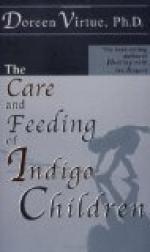When is this habit most frequently seen?
It begins in quite early infancy, and if not broken may last until children are six or seven years old.
Is the sucking habit a harmful one?
When persisted in it may produce a misshapen mouth or fingers. It constantly stimulates the flow of saliva and certainly aggravates disturbances of digestion during which the sucking habit is likely to be practised. It may lead to thrush or other forms of infection of the mouth. It is not necessary as a means of quieting a child, though it may in some degree cover up the consequences of bad feeding or bad training. On no account should the habit of sucking the “pacifier” be allowed as a means of putting children to sleep, or of quieting them while restless from dentition or indigestion.
How is the sucking habit to be controlled?
One should be sure in the first place that the constant sucking of fingers is not due to hunger from insufficient food. Sucking of the hands may often be controlled by wearing mittens or fastening the hands to the sides during sleep. In more obstinate cases it may be necessary to confine the elbow by small pasteboard splints to prevent the child from bending the arm so as to get the hand to the mouth.
When are nail-biting and dirt-eating seen, and how are they to be controlled?
These habits belong especially to children over three years old. They are seen particularly in those who are excessively nervous or whose general health is below par; sometimes in those who develop serious nervous diseases later in life. Children with such tendencies should be closely watched, and every means used to break up these habits early. Dirt-eating is a morbid craving which is rarely seen in a normal child.
At what age may a child generally be expected to go without wetting the bed during the night?
Usually at two and a half years, if it is taken up late in the evening. Some children acquire control of the bladder at night when two years old, and a few not until three years. After three years habitual bed-wetting is abnormal.
How should a young child addicted to bed-wetting be managed?
At three or four years of age, punishments are sometimes useful, especially when it seems to depend more upon the child’s indifference than anything else. They are of no value in older children, rewards being much more efficacious. In all cases one should give a child plenty of milk and water early in the day, but no fluids after 4 P.M., the supper being always of solid or semi-solid food. The child should be taken up regularly at ten o’clock or thereabouts. It often happens that the formation or continuance of the habit is due to the child being in poor general condition, to some irritation in the urine, or in the genital organs. Unless the simple means mentioned are successful the child should be placed under the charge of a physician.




